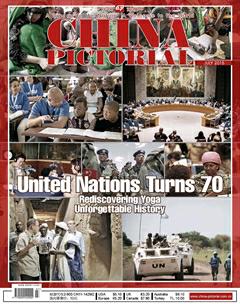Chinese Market in the Eyes of Cannes
by+Xiao+Bian+and+Yi+Lan

A globally-treasured tradition since 1939 but relatively recently well-known in China, the International Cannes Film Festival celebrated its 86th edition in May of this year. As show business has become more global in recent years, Cannes has become a top-shelf entertainment event above and beyond movies. Every year, the parade of actresses from all over the world down the red carpet makes headlines on major websites in China. And China has become more important for Cannes. “China is now the second largest market, which we must ensure is connected to the world,” asserts Pierre Lescure, president of the Cannes Film Festival.
“China Fever”
This years festival lasted 11 days before closing on May 24, and during its run, “China” remained on the tips of many tongues.
For starters, two Chinese films were selected for competition: Secret Sister Nie directed by Hou Hsiao-hsien and Jia Zhangkes Mountains May Depart. The former depicts a legendary Chinese story about swordsmen, and earned Hou the Best Director honor. The latter is a love story spanning several decades and paralleling the dramatic changes of the era. Zhao Tao, the female lead, snagged the Best Actress Award from the International Cinephile Society, a group independent of Cannes, for her groundbreaking performance.
Still, “China Fever” persisted even without any direct connections to Chinese movies. China Central Television presented a “Night of Chinese Movies” on Majestic Beach in Cannes, which fetched up to 200 Euros a ticket due to the attendance of both Chinese filmmakers and movie stars at the feast featuring champagne, fresh oysters and cake.
Also featured at the festival was a Chinese Film Market Overview, a three-day forum including multiple seminars by Chinese and French film specialists, covering topics related to the Chinese market and cooperative film production between the two countries. French filmmakers such as Jean Jacques Annaud, co-director of The Wolf Totem, and Philippe Muyl, director of Le Promeneur dOiseau (The Nightingale), shared their experiences collaborating with China.
As reported, Cannes 2015 witnessed 40 percent growth in registered buyers from China while those from Europe dropped precipitously.
Chinese movie fans have shown sustainable interest in the Festival even if the biggest draw is still the red carpet at the opening ceremony, evidenced by lengthy discussions about clothing choices of Chinese movie stars on Chinese websites and social media. This year, a star who wore a costume designed in old rural style popular years ago drew the most attention.
A few reports emerged covering the beach activities along with a handful of profiles of Chinese stars in major Festival magazines. Westerners focused on other aspects of China.
Opportunities
Western filmmakers agree on Chinas great potential even though they didnt talk much about the countrys movies during the festival.
Over the last 20 years, the breakneck development of the Chinese movie market has attracted global attention. China initiated reform of its movie market in 1994. In 2010, the Chinese box office reached 10 billion yuan on the mainland, and only three years later hit 20 billion yuan. In 2014, it rocketed to the neighborhood of 30 billion yuan. That year, Chinese movies earned 29.639 billion yuan, year-on-year growth of 36.15 percent. Moreover, 1,015 movie theaters opened along with 5,397 new screens in that year alone.
In 2015, Universals Furious 7 broke the Chinese mainlands box office record with its US$300 million take in only 15 days of release. Estimates predict that by 2017, China will likely overtake the United States as the worlds largest movie market.
No Westerner in the entertainment industry wants to let such opportunity slip through their fingers. In recent years, more and more filmmakers from Europe have established offices in China. “With each passing day, China is contributing more and more to global movie production and the creative industry,” noted President Pierre Lescure of the Cannes Film Festival in an interview with Chinese media at the festival. “The changes can be seen in the festival as well.” He agrees with predictions that China will become the worlds leading movie market.
Puzzles Behind Prosperity
Still, the booming Chinese movie market has been plagued by a few concerns despite the great opportunities.
First, Chinese movies from Hong Kong have always dominated the international market despite their recent decline. London-based Screen, one of the three major international film trade magazines, spoke highly of Hong Kong movies, noting that their strongest products in the international market are action, crime and horror films. Many filmmakers from Hong Kong remain creative forces behind mainland producers, as evidenced by productions such as The Taking of Tiger Mountain, Dragon Blade, and Zhongkui. These movies made extraordinary achievements in Chinas box office.
Many insiders point to the fact that in 2014, China produced more than 700 movies, but only less than half were ever released. “There are ‘three manys and ‘three fews in the Chinese movie market,” explains Luan Guozhi, associate counsel from the Movie Administration of Chinas State Administration of Press, Publication, Radio, Film and Television. “The ‘three manysand ‘three fews refer to a great number of productions but few that are exported; many films screened for public welfare yet few for commercial distribution; and more offerings for overseas art houses but fewer that reach mainstream consumption in major chains.”
The Wolf Totem is a prime example of how Chinese movies can “go global.”First, efforts must be made to tell the story in a proper way. During an interview by Chinese media, Xavier Castano, French producer of The Wolf Totem, opined that“using different strategies for distribution in different countries” is the secret formula for success. The Wolf Totem has made the deepest impact on France of all Chinese movies by attracting over a million spectators in the country.

